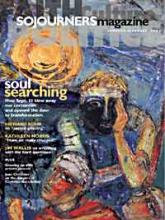Getting supplies there was the easy part.
The late October call from Pakistan to our hotel in Dushanbe, Tajikistan, brought horrible news. Most of the staff of a womens health clinic in Kabul had been wiped out. Dr. Belquis, the pediatrician, Dr. Rahima, the internist, and one of nurses had been killed in their homes during the previous week of U.S. bombing of Kabul. The news got even worse: Four students in a vocational training center for boys were killed the same week when U.S. planes bombed Jalalabad.
Afghanistan was already a disaster zone before the first American bomb dropped. The country has suffered 23 years of war and three years of withering drought in the north. In October, the U.N. Development Program estimated that 70 percent of the Afghan population was undernourished.
For several years, the Mennonite Central Committee has sent aid to Afghanistan through Pakistan and, with the help of Iranian Red Crescent, through Iran. But when the U.S. bombing started, both countries sealed their borders with Afghanistan. MCC asked if I could help them locate an alternate route into Afghanistan during the bombing.
I learned that an Afghan-American organization called Help the Afghan Children Inc. was planning a mid-October delegation to Afghanistan, through Tajikistan in the north. Since many perceive this war to be a conflict between Islam and Christianity, I was particularly pleased when the Muslim director of the group invited me to join her in this trip and welcomed funds from MCC and other organizations for aid to Afghanistan. The delegation carried $130,000, which we used to purchase 239 tons of wheat, sugar, cooking oil, and blankets in Tajikistan and to hire 23 10-ton trucks to carry our material to 3,700 Afghan families in camps in northeastern Afghanistan.
Read the Full Article
